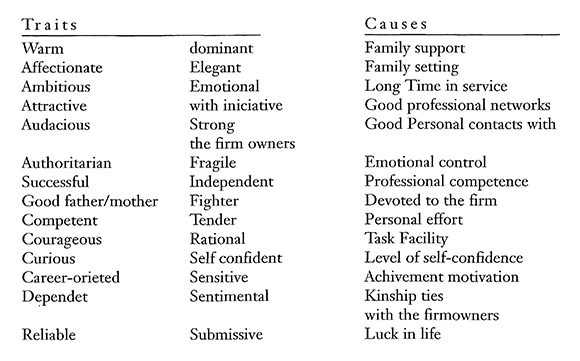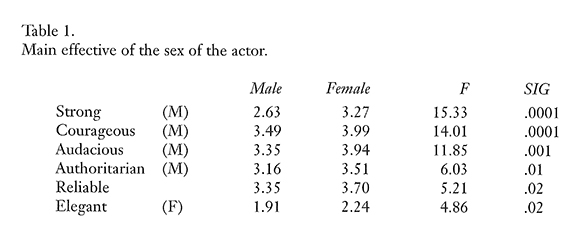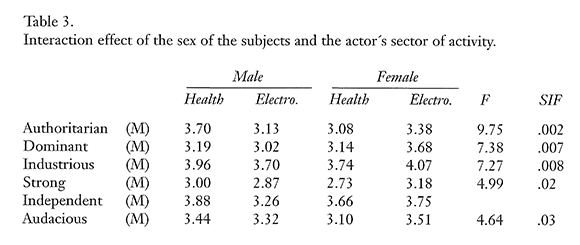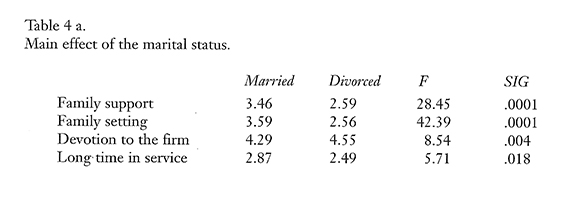Serviços Personalizados
Journal
Artigo
Indicadores
-
 Citado por SciELO
Citado por SciELO -
 Acessos
Acessos
Links relacionados
-
 Similares em
SciELO
Similares em
SciELO
Compartilhar
Psicologia
versão impressa ISSN 0874-2049
Psicologia vol.11 no.1 Lisboa jan. 1996
https://doi.org/10.17575/rpsicol.v11i1.592
Gender and management Stereotypes and attributions for a sucessful career
Conceição Nogueira*; Lígia Amando**
*-**Centro de Investigação e Estudos de Sociologia Instituto Superior de Ciências do Trabalho e da Empresa, Lisboa
ABSTRACT
The experiment reported here belongs to a larger research project, which aims at analyzing the effects of gender representation and expectations on the perception of managerial power and success. In this experiment 240 high school students of both sexes received a short description of a successful manager. The actor’s sex, marital status (married/divorced) and sector of activity of the organization (electronics/health) where the manager currently worked were manipulated in this description, but the 8 versions included the information that the organization was going through a particularly successful period since the actor has taken over as manager. Subjects were then asked to report their impressions of the actor in a list of traits, to attribute causes to the position currently reached by the actor in (his/her) career and to estimate to what extent they would like to reach a similar position in their future professional careers. Results will be discussed within the framework of gender and management representations, as well as gender identities.
RESUMO
O experimento aqui relatado integra-se num mais lato projecto de pesquisa que visa analisar os efeitos da representação dos sexos e das expectativas na percepção de poder empresarial e sucesso. Neste experimento, 240 estudantes do ensino secundário de ambos os sexos receberam uma curta descrição de um gestor de sucesso. O sexo do actor, o seu estado civil (casado/divorciado) e o seu sector de actividade na organização (electrónica/saúde) em que o gestor trabalhava actualmente eram manipulados nesta descrição, mas as 8 versões incluíam a informação de que a organização estava a atravessar um especial período de êxito, desde que o actor tinha tomado conta da gerência. Aos sujeitos era então pedido que exprimissem as suas impressões sobre o actor através de uma lista de traços, que atribuíssem causas à posição correntemente alcançada pelo actor na sua carreira e que estimassem em que medida eles próprios gostariam de alcançar uma posição semelhante na suas futuras carreiras profissionais. Os resultados são discutidos quer no âmbito das representações dos sexos e do poder empresarial, quer no âmbito das identidades sexuais.
Introduction.
One of the main features of the recent changes in the role of women in society, concerns their entry into paid employment in most Western countries, including Portugal. However, in spite of a significant growth of women in the field of management, the sex ratios in this occupation remains particularly unbalanced. According to cross-cultural studies (Davidson & Cooper,1992) prejudice and discrimination against female managers, as well as differences in life circumstances of male and female managers are some of the factors that may account for the segregation of women from management positions.
Although some empirical evidence in this field shows that men and women have different leadership styles (Loden, 1985), metanalysis of the research comparing men and women leadership styles evidences both the presence (Eagly, Karau & Johnson, 1992) and the absence of differences between the sexes (Eagly & Johnson, 1990). On the other hand, some authors stress that leadership characteristics such as assertiveness and influential behaviour are strongly associated with the masculine gender role (Gerber, 1988). As a result, women have to adopt a male behaviour in order to achieve leadership (Eagly & Karau, 1991) and enter male-dominated positions ( Eagly, Makhijani & Klonsky, 1992) thus paying the price of «loosing» feminine characteristics in the eyes of the observers. Within the social-role model framework (Eagly, 1987) sex differences in behaviour, as well as differences in gender-stereotypic expectations stem from the social positions occupied by women and men in society which also account for the content of gender stereotypes (Nieve & Gutek, 1981).
However, the link between the male stereotype and the management occupation stereotype has remained stable (Marshall, 1984) since the 7Os (Schein, 1973,1975), apparently resisting the changes in the social positions of men and women in society. The successful manageds pattern of behaviour still requires a set of abilities that corresponds to the male gender identity and conflicts with the female gender identity (Wiley & Eskilson, 1990).
Therefore it is possible to assume that the symbolic differentials associated with gender categories may account for the differences in expectations and attributions of male and female actors in management positions. Within this framework, research by the second author has evidenced the assymetry of gender stereotypes in working contexts, wich are dominated by the male model and meanings to the extent that «feminine» behaviour looses its specific meaning, although this specificity remains functional to differentiate against women (Amando, 1990). Furthermore, evidence concerning attributions for the sucessful performance of male and female actors (Deaux,1985) and implicit theories about achievement (Sousa & Leyens, 1987) is in accordance with this perspective, as the notions of sucess and achievement carry a masculine meaning that differentiates female actors’ performance. Besides the assymetry on the symbolic resources available to women and men that places women in a unfavourable position in male-dominated occupations, other studies have evidenced an assymetry in male and female managers’ life circumstances, as male managers are reported to have more supportive families whereas female managers are either single or belong to dualcareer families (de Conink & Godard, 1992; Nicholson & West, 1988).
Marital status may therefore play an important role in the judgements of male and female successful managers, as our study intends to investigate. On the other hand, since previous research carried out in Portugal on the effect of gender stereotypes in judgements of male and female actors in working contexts only includes adult subjects, already employed (Amâncio, 1989), this study aims at investigating those same effects among nonemployed young subjects.
Hypothesis.
Concerning the caracteristics associated with a successful manager, as well as the explanations for the actor’s successful career,
la. We expected both feminine and masculine traits to be more strongly associated with the female actor than with the male actor;
lb. We also expected both external and internal causes to be more strongly attributed to the female actor than to the male actor;
2. Furthermore, we expected the previous effects to be more strongly affected by the marital status in the case of the female actor, than in the case of the male actor;
3. Another prediction concerns the effect of the sector of activity on traits. Assuming that an electronics firm is a more typical masculine work setting than a health firm, we expected the female manager of an electronics firm to elicit more masculine traits than the female manager of a health firm but, on the other hand, we did not expectd any effect of the sect of activity on the image of the male manager.
Method.
Subjects.
241 high school subjects of both sexes (140 female and 101 male) participated in this experirnent (mean age=16).
N=241
Male subjects (N=100)
Female subjects (N=141)
Design.
Subjects were run in group sessions and randomly assigned to each treatment condition of a 2x2x2x2 factorial design. The independent variables were sex of the subjects, sex of the actor, marital status of the actor (married and divorced) and the sector of activity of the firm (electronics and health).


Procedure.
The study was introduced as an investigation on impression formation. Subjects were asked to read one of the eight short descriptions of a manager in which the independent variables were manipulated. The last part of the description, which was common to all experimental condi ti ons, mentioned the firm’s increasing success since the actor had taken over the management position. After reading the short description subjects were requested to further describe the actor with a list of traits and estimate the adequacy of a number of causes for the actor’ s occupational success. Finally subjects were asked how much they would like to attain a similar position in their future career.
The Dependent Variables.
In order to describe the actor, subjects received a list of 29 traits in alphabetical order, followed by 5 point scales ( 5=this characterist fits the person very weell and 1=does not fit at all). The list of traits included 9 masculine and 9 feminine traits, according to the consensual classifications obtained in a previous study (Amando, 1989). The other 11 traits included some that had not been consensually classified as either masculine or feminine, as well as other characteristics that were related with the family role and the occupational role. In order to explain the actor’s success subjects received 14 causes in alphabetical order, which induded causes pertaining to the family context, the classical causes of luck, task facility, effort and capacity. Causes were followed by 5 point scales (5=this cause contributed very much to the actor’s actual position and 1=did notcontribute at all).The question concerning how much the subjects would like to attain the actor’s position in their future career was also followed by 5 point scales (5=1 would like very much and 1=1 would not like at all).
Results.
Main effects of the sex of the actor were found on several masculine traits and on one feminine trait. As shown in Table 1, all these traits were more strongly associated with the female manager than with the male manager. Main effects of the marital status were also found on three traits. Married managers were seen as more career-oriented (mean=4.39) than divorced managers (mean =3.58) (F (1,240)=3.77, p=.05) whereas divorced managers were seen as more dominant (mean=3.50 and mean=3.03 ) (F(1,240)=9.98,p=.002) and independent (mean =4.01 and mean=3.25) (F(1,240)=20.10,p=.0001). Interaction effects of the sex of the actor and the marital status were also found on three masculine traits. As can be seen in Table 2, divorced male managers were considered more audacious, courageous and strong than married male managers and the reverse happened in the case of female managers, although in this case, differences as a function of the marital status are less accentuated. Table 3 shows the interaction effects of the sex of the subjects and the firm’s sector of activity that were found on several masculine traits. Male and female subjects’ patterns of results differ on all traits, as male subjects consider that a health firm requires more masculine characteristics than an electronics firm, whereas female subjects have the opposite opinion.



Concerning the explanations for the actor’s success, main effects of the marital status were found on several causes. Inspection of Table 4a) indicates that subjects attributed the «family support», the «family setting» and the «long time in Service» more strongly to the married manager than to the divorced manager, whereas the sucess of the latter was more strongly attributed to the «devotion to the firm». This latter cause was also more attributed to the female manager (mean=4.53) than to the male manager (mean=4.32) (F(1,240)=5.14, p=.02) but the interaction of the sex of the actor and the marital status was not significant. Furthermore (Table 4b), female subjects considered the «good professional networks» the «task facility» and the «level of self-confidence» as better explanations of the manager’ssuccess than male subjects. An interaction effect of the sex of the subjects and the actor’s marital status shows that female subjects’ scores on the «good personal contacts with the firm owners» were less influenced by the marital status (mean =4.1 for the married actor and mean=4.20 for the divorced,actor) than male subjects’ scores (means=3.84 and 4.04 respectively) (F (1,240)=5.47,p=.02) but the «task facility» was more attributed to married managers (mean=3.26 and mean=2.90 for the divorced managers) by male subjects than by female subjects (means=3.30 and 3.55 respectively) (F(1,240)= 3.9g,p=.04).


As to how much subjects would like to attain the actor’s position in their future career we found a significant main effect of the sex of the actor (F (1,240)=4.26, p=.04). According to these results, the female manager is a better role-model (mean=4.32) to subjects of both sexes than the male manager (mean=4.05).
Discussion.
Our results support the hypothesis that masculine traits would be more strongly associated with the female actor, but they do not support this hypothesis in the case of feminine traits. However, contrary to our preditions, results indicate that marital status has a stronger influence on the attribution of masculine traits in the case of the male actor, than in the case of the female actor.
Furthermore, our results do not entirely support the hypothesis that being a manager in an electronics firm would require more masculine characteristics than being a manager in an health firm, as this perception was shared only by female subjects. This result may reflect the salience of medical doctors in management positions of health firms in Portugal, and this tentative explanation could be investigated in a future research with a more accurate operationalization of this variable. Also contrary to our predictions, attributions for the actor’s success were more influenced by the marital status than by the sex of the actor. Moreover, the few interaction effects that were found on attributions concerned marital status and the sex of the subjects instead of marital status and the sex of the actor. On the other hand, non-predicted effects of the sex of the subjects were found on several causes.
According to our results, the management occupation is strongly associated with male stereotypic characteristics and women in this position are not perceived as androgynous women but rather as «masculine» women. This over estimation of masculinity in the case of the female manager places her marital status in a secondary position, which is only apparent, since attributes such as courage, audacity and strength are particularly enhanced in the case of the female married manager. It seems therefore that subjects do not associate greater independence and autonomy with a female manager who combines her traditional role with an occupational role, such as management, but they consider, instead that it takes «guts» to do it. In this perspective, only a particular woman is able to achieve the combination of these roles.
As opposed to the results concerning the traits, attributions for the manager´s success are more influenced by the marital status. Subjects enhance the importance of the family setting and the family support in the case of the married managers, precisely those conditions that are easier to achieve by male managers than by female managers. Other external attributions such as the «task facility», «good professional networks» and «good contacts with the firm owners» are particularly stressed by female subjects who also stress the level of selfconfidence as an explanation for success. Overall, internal and controllable attributions seem less salient than those related with family conditions and organizational conditions.
These results may reflect the particular situation of our subjects who do not yet possess a specialized training and are anticipating the entrance into the adult word. The combination of the adult roles in the family and at work may therefore be particularly salient to them, and interpersonal networks may also be perceived as important supports of a professional career. The choice of the female manager as a role-model is another result requiring an interpretation that takes into consideration the identity of young people. Evidence in this field shows that when the comparais on with the adults is made salient, male and female young people’s self-images incorporate more feminine characteristics and are similar to the image of the adult woman (Vala, 1986). Since the adult world is strongly associated with masculinity, professional women in power positions may represent the intermediate step that reduces the distance between youth and the adult world, as they are only a «pale imitation» of the «real thing».
References
Amâncio, L. (1989) Factores Psicossociológicos de discriminação da mulher no trabalho. Unpublished PHD Dissertation, ISCTE. [ Links ]
Amâncio, L. (1990) Defining limits of the feminine behaviour. The assymetrical functions of gender stereotypes. [ Links ] Paper presented at the IX General Meeting of the EAESP, Budapeste.
Deaux, W. (1985) Sex and gender. Annuel review of Psycology, 36,49-81. [ Links ]
De Coninck, F. & Godard, F. (1992). Itinéraires familiau, itinéraires professionnels: vers de nouvelles biographies féminines. Sociologie dn Travail, 1, 65-79. [ Links ]
Eagly, A. H., & Karau, S. J. (1991). Gender and the emergence of leaders: a meta -analysis. Journal of Personality, and Social Psychology, vol. 60(5), 685-710 91. [ Links ]
Eagly, A. H. (1987). Sex differences in socialbehavior. A social-role interpretation, N.Y.: Erlbaum. [ Links ]
Eagly, A. FL, Makhijani, M. G., & Klonsky, B. G. (1992). Gender and the evaluation of leaders: a meta-analysis. Psychological Bulletin, vol. 111(1), 3-22 [ Links ]
Gerber, G. I. (1988). Leadership roles and the gender stereotype traits. Sex roles, vol. 18 (11-12), 649-68-96. [ Links ]
Marshall, J. (1984). Women managers-traveller in a male world. Chichester: John Wiley & Sons 5. [ Links ]
Nicholson, N., & West, M.A. (1988). Managerial Job Change. Men and Women in transition. New York: Cambridge University Press. [ Links ]
Nieva, V F., & Gutek, B. A. (1981) Women and work, A psychologicalperspective. New York: Praeger. [ Links ]
Schein, V (1973) The relationship between sex-role stereotypes and requisite management characteristics. Journal of Applied Psychology, 57,95-100. [ Links ]
Schein, V (1975) The relationship between sex-role stereotypes and requisite management characteristics among female managers. Jornal of Applied Psychology, 60, 340-344. [ Links ]
Sousa, E., & Leyens, J. (1987). A priori vs. spontaneous models of attribution: the case of gender and achievement. British Journal of Social Psychology, 26, 281-292. [ Links ]
Vala, J. (1986). Identidade e valores da juventude portuguesa - uma abordagem exploratória. Desenvolvimento, número especial. [ Links ]
Wiley, M.G., & Eskilson, A. (1990) What Price success? Evaluations of male and female managers. SocialFocus, 23, n.o 2, 115-127. [ Links ]














